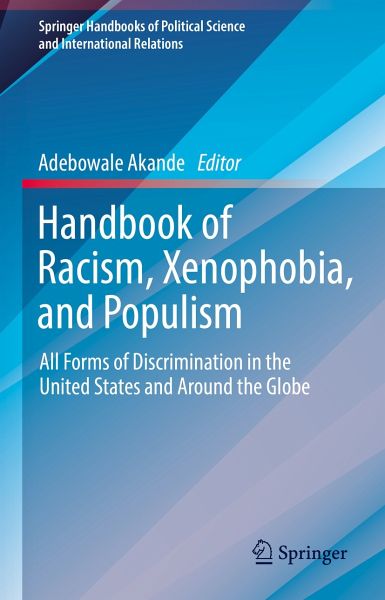
Handbook of Racism, Xenophobia, and Populism (eBook, PDF)
All Forms of Discrimination in the United States and Around the Globe
Redaktion: Akande, Adebowale
Versandkostenfrei!
Sofort per Download lieferbar
272,95 €
inkl. MwSt.
Weitere Ausgaben:

PAYBACK Punkte
136 °P sammeln!
This handbook presents the roots of symbolic racism as partly in both anti-black antagonism and non-racial conservative attitudes and values, representing a new form of racism independent of older racial and political attitudes. By doing so, it homes in on certain historical incidents and episodes and presents a cogent analysis of anti-black, Jim Crowism, anti-people of color (Black, Latino, Native Americans), and prejudice that exists in the United States and around the world as a central tenet of racism.The book exposes the reader to the nature and practice of stereotyping, negative bias, so...
This handbook presents the roots of symbolic racism as partly in both anti-black antagonism and non-racial conservative attitudes and values, representing a new form of racism independent of older racial and political attitudes. By doing so, it homes in on certain historical incidents and episodes and presents a cogent analysis of anti-black, Jim Crowism, anti-people of color (Black, Latino, Native Americans), and prejudice that exists in the United States and around the world as a central tenet of racism.
The book exposes the reader to the nature and practice of stereotyping, negative bias, social categorization, modern forms of racism, immigration law empowerment, racialized incarceration, and police brutality in the American heartland. It states that several centuries of white Americans' negative socializing culture marked by widespread negative attitudes toward African Americans, are not eradicated and are still rife. Further, the book provides a panoramic view of trends of racial discrimination and other negative and desperate challenges that Black, Indigenous, and People of Color face across the world. Finally, the volume examines xenophobia, racism, prejudice, and stereotyping in different contexts, including topics such as Covid-19, religion and racism, information manipulation, and populism.
The book, therefore, is a must-read for students, researchers, and scholars of political science, psychology, history, sociology, communications/media studies, diplomatic studies, and law in general, as well as ethnic and racial studies, American politics, global affairs, populism, and discrimination in particular.
The book exposes the reader to the nature and practice of stereotyping, negative bias, social categorization, modern forms of racism, immigration law empowerment, racialized incarceration, and police brutality in the American heartland. It states that several centuries of white Americans' negative socializing culture marked by widespread negative attitudes toward African Americans, are not eradicated and are still rife. Further, the book provides a panoramic view of trends of racial discrimination and other negative and desperate challenges that Black, Indigenous, and People of Color face across the world. Finally, the volume examines xenophobia, racism, prejudice, and stereotyping in different contexts, including topics such as Covid-19, religion and racism, information manipulation, and populism.
The book, therefore, is a must-read for students, researchers, and scholars of political science, psychology, history, sociology, communications/media studies, diplomatic studies, and law in general, as well as ethnic and racial studies, American politics, global affairs, populism, and discrimination in particular.
Dieser Download kann aus rechtlichen Gründen nur mit Rechnungsadresse in A, B, BG, CY, CZ, D, DK, EW, E, FIN, F, GR, HR, H, IRL, I, LT, L, LR, M, NL, PL, P, R, S, SLO, SK ausgeliefert werden.












